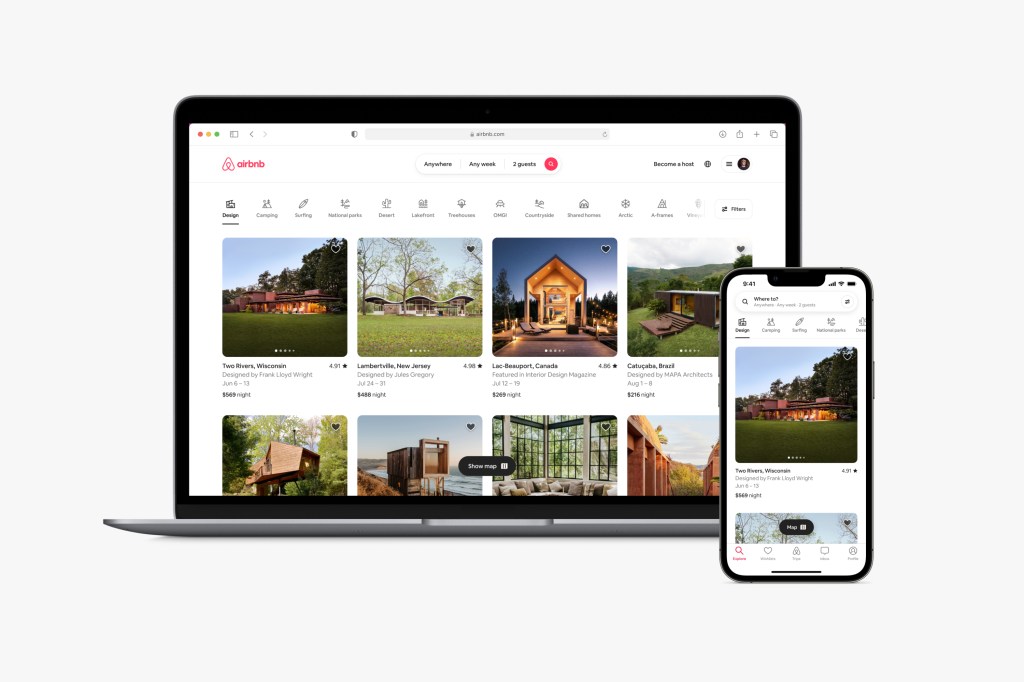Last year, Airbnb CEO Brian Chesky said that the single-biggest challenge for the company was thinking like a startup, despite Airbnb’s tremendous growth over the last decade. The pandemic, he said, spurred the need to simplify and focus to survive. Since, Airbnb has put out hundreds of new features.
Today, that continues with Airbnb’s latest feature updates. The biggest changes include a new search based on category, the ability to book two listings in one flow for stays over a week and AirCover for guests, which is basically Airbnb-provided travel insurance.
The updates work toward two big goals for the company.
The first is to inspire the world to get back to travel. Chesky believes that a new era of travel is about to begin and Airbnb is leaning into that. Hard. By reinventing search, automatically stringing together listings for longer-term travel (which is growing increasingly popular) and by protecting users under AirCover, Airbnb is opening the door for guests looking to get back out there in a safe way.
“We think people are ready to dream again,” said Chesky. “A lot of people have been sequestered at home for two years. Many people haven’t taken that big trip for the first time. And so we want to encourage people to get out of their house and venture this big world.”
The second goal is more around the health of the business. Airbnb lives and dies by its individual hosts. Small operations with one, or maybe a few, properties. Category search and split stays gives hosts from all corners of the platform better visibility, whether or not they meet the exact specifications of a user’s search.
Airbnb categories
Continuing in the vein of flexible search, Airbnb is today releasing a new way to search by categories. In fact, the home page now just launches into a search for one week, with flexible dates, and shows a scrolling bar at the top of Airbnb’s new categories, rather than the OG search bar that asks “Where are you going?”
The new search includes type of home (such as A-frames, cabins, castles and tiny homes), as well as in-home features (amazing pools, chef’s kitchens and creative spaces), location type (arctic, beach, farm) and even activity (surfing, golfing, ski-in/ski-out).
Since the start of the pandemic, Airbnb has been focused on flexibility for guests. But the business benefits are crystal clear. If users are searching for the same general tourism destinations, and they have to search by some random hard-and-fast dates, their inventory options will be severely limited.
Airbnb has hosts in hundreds of thousands of cities across the globe, and flexible search allows for these locations to be discovered.
The company first fiddled with flexible search back in February of 2021, offering users the chance to search by length of stay (weekend getaway, week-long vacation, month-long vacation and so on) without setting specific dates.
In May that year, Airbnb announced it would add flexible matching and flexible destinations. Flexible Matching doesn’t lock users in to every single search criteria that they select, but shows Airbnbs that have most of the criteria covered, while Flexible Destinations marked the origin of today’s categories announcement, allowing users to search for beach-side properties or treehouses.
This ramping up of flexible search crescendos into today’s release, which puts categories front and center.
What’s more, Airbnb is using a combination of machine learning and manual review to organize listings using structured data. For example, listings in the “Design” category either show the architect or the publication in which the property was featured as a “title.” Listings in the “Shared Home” category show the host’s name as the title, as that’s likely the more important piece of information a user would need based on the category.
The same strategy is used for the featured image on listings — for example, the first picture you’ll see after searching in the pool category is, of course, the pool.
This means that listing titles and descriptions have become far less significant, giving individual hosts a better chance at competing on the merit of their property, rather than their marketing prowess.
Category search also works alongside destination search and flexes based on the location. For example, if you’re searching for places in France, categories like “Historic Homes” or “Vineyards” will pop up.
Airbnb split stays
Airbnb is also introducing split stays. The company’s research shows that long-term stays are at an all-time high, more than doubling from two years ago. To help accommodate this demand, Airbnb split stays allow users to book, let’s say, a two-week trip and stay in two different listings, just in case neither of those listings are available for the full two weeks.
Split stays are available across 14 of Airbnb’s new categories, as well as for specific destination searches. When selected, the UI shows the distance between the two listings and sets up an easy flow for guests to book both different listings without loads of tabs open.
Split stays are shown on all searches that are a week or longer.

Right now, says Chesky, the split stay functionality is controlled exclusively by Airbnb, automatically pairing two properties that match the criteria for the user. But it also lays the foundation for what Airbnb could do in the future with itineraries.
Currently, it’s difficult to book multiple Airbnbs for a long-term trip across a variety of locations. Let’s say a user wanted to spend the summer traveling across Europe or spend a couple of weeks on a road trip across the U.S. Airbnb has no feature set to help the user plan lodging for that trip.
With today’s release, Airbnb could easily build off of split stays and offer itinerary creation and organization around lodging.
“The moment we can intelligently pair two homes, we can eventually pair three homes or two homes and an experience or a home and an experience plus something else,” said Chesky. “Then, we can give a user control. You can then start to integrate it with wishlist down the road. It really starts to become a true itinerary building app, which we’re not getting right now. But the technology exists.”
Airbnb AirCover for guests
Last year, Airbnb introduced its insurance product, AirCover, for hosts. It was meant to inspire even more individuals to join the platform as hosts and list their property, guaranteeing coverage of any damage or issues. For example, many Airbnb hosts were reluctant to allow pets to stay at their listings despite the tremendous increase in pet ownership since the pandemic. AirCover solved for that.
Today, Airbnb is announcing AirCover for guests, too. Guests will be protected against host cancellations, check-in issues, and will have access to a 24/7 Safety Line. Moreover, Airbnb is offering a “Get-What-You-Booked” guarantee. If a listing isn’t as it was advertised, Airbnb will give guests a refund or find them a listing of the same or better quality for their trip.
Again, this is meant to give travelers confidence to get back out there and go on vacation. Chesky says that it rivals the kind of coverage offered by many hotel chains and certainly beats out other booking sites like Booking.com and VRBO.
The bottom line
All of these updates are meant to bring enterprise-grade infrastructure to a vast community of individual hosts. Category search and split stays increase visibility to hosts who are potentially off the beaten path or can’t serve the exact specifications of a user’s search.
The last time we talked to Chesky, he said that the company’s focus was on individuals. But a platform full of individuals, both on the host and guest side, means a massive amount of variability from one search, one listing and one booking to another.
The unique, one-of-a-kind nature of traveling with Airbnb is a huge part of its charm. There are no cookie-cutter hotel rooms on the platform. But that also means there is more variability, and variables can lead to issues. Airbnb listings are all over the world, from the smallest towns to the biggest cities, from the deserts to the arctic. Literally. Without the processes and protocols of large hotels and chains, and without their resources around service, the end experience of the guest can vary wildly.
AirCover for guests is meant to give as much protection as possible to guests who are arguably spending a big chunk of money on their vacation, just like they’d get from a large hotel.
“We want to embrace the ‘one of a kindness’ of our community,” said Chesky. “The great thing about one of a kind is that people are different, they’re unique. The problem is that people are different, and unique. The more one of a kind it is the more variability. And so we were trying to think about how can we provide some protection for you and we’re the only ones that offer this. Is this as consistent as a Hilton? Probably not. But, with these protections, you get pretty close to where a hotel can get, and you’re far beyond what Booking.com or VRBO or Expedia can do there. You’re on your own when you book on those sites.”
Meanwhile, category search and split stays ultimately aim to increase visibility to all kinds of hosts, across all different kinds of homes and locations, to generate revenue and introduce guests (and their wallets) into their communities.































Comment